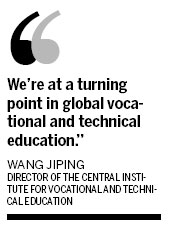
Experts are calling for more international cooperation in the establishment of vocational and technical schools.
"China and the world should combine forces in running vocational and technical schools," said Wang Jiping, director of the Central Institute for Vocational and Technical Education, under the Ministry of Education.
"The priority in China's vocational education has been transferred to the pursuit of quality from the pursuit of largeness," Wang said.
|
 |
"We (Chinese vocational schools) are borrowing advanced experiences from developed countries and are cooperating more in the management of schools."
Wang also said he believes China should provide help to countries and places that are in need.
"We are actually running the mission," he said. "For example, we help some areas in Africa build vocational schools, train officials and school heads and establish curriculum."
Wang said China is playing an increasingly important role in global vocational and technical education.
"A solid proof of that is that the third International Congress on Technical and Vocational Education and Training picked China as its conference site," Wang said. The event was held in Shanghai in May.
"We're at a turning point in global vocational and technical education," Wang said.
Liu Yandong, State councilor, said during the congress in May: "(Technical and vocational education and training) has an important role to play in China's modernization efforts and will therefore be made to embrace greater opportunities for development."
Dai Yuwai, president of the Tianjin Light Industry Vocational Technical College, spoke about the experiences he had in witnessing international cooperation with the Technical and Further Education Institutes in Australia.
"We have been sending our faculty members to receive training in Australia since 2011 and expect them to bring back more valuable curriculum," he said. "Western countries want our students as human capital. We treasure their advanced experiences, including values and curriculum.
"We are also planning to invite experienced Australian teachers to give lectures in our school," Dai said.
After returning from Australia, Zhang Yonghong, one of the exchange faculty members of the school, added to the discussions held in her classes.
"I teach management practice, which involves many management theories," she said. "In the past, I always struggled when delivering boring lectures to students. The content was too dry and they didn't want to listen.
"But now I've added panel discussions, presentations and case study sessions to our class. And I can see that the students have become more interested and active in class."
A report about China's vocational and technical education from 2002 to 2012, released in October, provides a few examples of international cooperation in that field of education in the past decade.
For example, China and Australia together held a vocational education and training program in 2002 in Chongqing. The program, which was authorized and carried out by the Ministry of Commerce, the Ministry of Education, the Chongqing government and the Australian Agency for International Development, ended in 2007.
More than 30 schools in Chongqing participated in a trial project with the Australia Technical and Further Education Institutes.
Australia invested nearly A$20 million ($20.7 million) in the program, and China invested A$5 million.
The Education Ministry also cooperates with countries including Germany, Australia and the United States to increase the number of teachers' exchange and training programs. Vocational education has developed rapidly in the past decade.
Nearly 73 million students graduated from vocational and technical schools in those 10 years. The employment rate among graduates of secondary vocational and technical schools stands at more than 95 percent, and that of higher vocational and technical schools at 87 percent, according to the report.
luowangshu@chinadaily.com.cn







